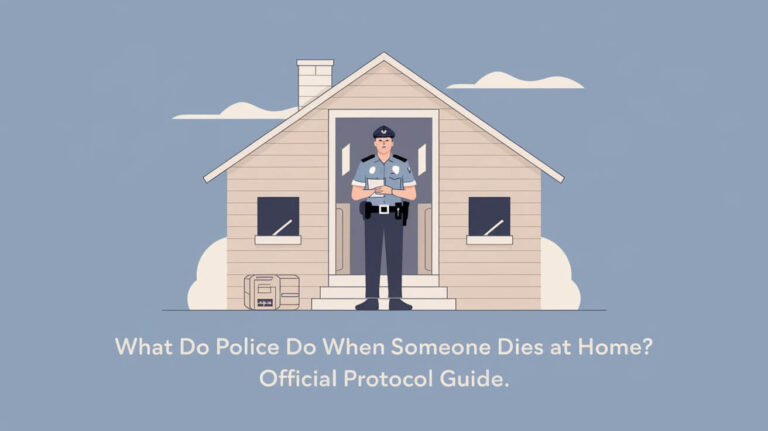How to Become a Police Detective: Your Step-by-Step Guide

Becoming a police detective involves completing police academy training, gaining experience as a patrol officer, and developing crucial investigative skills. This guide will walk you through the steps, requirements, and challenges of pursuing this rewarding career in law enforcement.
Police detectives play a vital role in solving crimes and keeping communities safe. If you’re drawn to a career that combines analytical thinking, problem-solving, and a strong sense of justice, becoming a police detective might be your calling.
Let’s dive into the world of police detective work and explore how you can turn this aspiration into reality.
What is a Police Detective?
Police detectives are skilled law enforcement professionals who investigate complex crimes, gather evidence, and help bring criminals to justice. They’re the backbone of criminal investigations, often working on cases that uniform officers can’t solve during their initial response.
Roles and Responsibilities
A police detective’s job goes far beyond what you see in TV shows. Here’s what they typically do:
- Investigate serious crimes like murders, robberies, and assaults
- Collect and analyze evidence from crime scenes
- Interview witnesses and suspects
- Write detailed reports on their findings
- Work closely with prosecutors to build strong cases
- Testify in court as expert witnesses
Types of Police Detectives
The field of detective work offers various specializations:
- Homicide detectives
- Narcotics detectives
- Fraud detectives
- Cybercrime detectives
- Sex crimes detectives
- Cold case detectives
Each type requires unique skills and knowledge, but all share a common goal: solving crimes and bringing criminals to justice.
Education Requirements for Aspiring Police Detectives
While the path to becoming a police detective can vary, education plays a crucial role in preparing you for this challenging career.
High School Diploma or GED
At minimum, you’ll need a high school diploma or equivalent. During high school:
- Focus on subjects like English, math, and social studies
- Join clubs or activities that develop leadership and teamwork skills
- Consider taking criminal justice courses if your school offers them
College Degree Options
Many police departments now prefer or require candidates to have a college degree. Popular options include:
- Criminal Justice
- Law Enforcement
- Forensic Science
- Psychology
- Sociology
A bachelor’s degree can give you an edge in the competitive field of law enforcement and may lead to faster career advancement.
Majors That Can Help Your Detective Career
While criminal justice is a natural fit, other majors can also prepare you for detective work:
- Computer Science (for cybercrime investigation)
- Accounting (for financial crime investigation)
- Chemistry (for forensic analysis)
- Foreign Languages (for international crime investigation)
Remember, any degree that sharpens your critical thinking and communication skills can be valuable in this field.
Steps to Become a Police Detective
Becoming a police detective is a journey that requires dedication, hard work, and patience. Here’s a step-by-step guide to help you navigate the process:
Meet Basic Requirements
Before you can even think about becoming a detective, you need to meet these basic criteria:
- Be at least 18-21 years old (varies by department)
- Have U.S. citizenship
- Possess a valid driver’s license
- Pass a background check
- Have no felony convictions
Complete Police Academy Training
The next step is to join the police force and complete academy training. This typically involves:
- Physical fitness tests
- Firearms training
- Legal education
- First aid and emergency response training
- Communication skills development
Academy training can last anywhere from 13 to 36 weeks, depending on the department.
Gain Experience as a Patrol Officer
After graduating from the academy, you’ll start as a patrol officer. This crucial step allows you to:
- Learn the ins and outs of police work
- Develop street smarts and instincts
- Build relationships within the community
- Gain hands-on experience in handling various situations
Most departments require officers to work on patrol for 2-5 years before they can apply for detective positions.
Develop Essential Skills
While working as a patrol officer, focus on honing these key skills:
- Observation and attention to detail
- Critical thinking and problem-solving
- Interpersonal communication
- Report writing
- Time management
These skills will be invaluable when you transition to detective work.
Pursue Specializations and Additional Training
To stand out as a detective candidate, consider:
- Taking courses in criminal investigation techniques
- Learning about forensic science and evidence collection
- Studying interview and interrogation methods
- Gaining proficiency in relevant technologies and databases
Many departments offer specialized training programs for aspiring detectives.
The Police Detective Career Path
Understanding the career progression can help you set realistic goals and expectations.
Entry-Level Positions
Most detectives start their careers as patrol officers. This foundational experience is crucial for understanding the day-to-day realities of police work.
Advancing to Detective Rank
After gaining experience and proving your skills, you can apply for detective positions. This usually involves:
- Passing a written exam
- Undergoing an oral interview
- Demonstrating your investigative abilities
The competition for detective positions can be fierce, so make sure you’re well-prepared.
Promotional Opportunities Beyond Detective
Once you’ve become a detective, there are still opportunities for advancement:
- Sergeant
- Lieutenant
- Captain
- Chief of Detectives
Each step up the ladder brings more responsibility and leadership opportunities.
Skills Needed to Excel as a Police Detective
Successful detectives possess a unique blend of skills that allow them to solve complex cases.
Critical Thinking and Problem-Solving
Detectives must:
- Analyze complex information
- Think outside the box
- Connect seemingly unrelated pieces of evidence
- Develop and test theories
Communication and Interpersonal Skills
A detective’s job involves constant interaction with:
- Victims and witnesses
- Suspects
- Other law enforcement officers
- Prosecutors and judges
- The media
Strong communication skills are essential for gathering information and presenting findings effectively.
Attention to Detail
The smallest clue can break a case wide open. Detectives need to:
- Notice and document minute details at crime scenes
- Spot inconsistencies in statements
- Keep meticulous records
Physical Fitness and Endurance
While detective work is often less physically demanding than patrol work, detectives still need to:
- Be prepared for potentially dangerous situations
- Have the stamina for long hours of work
- Stay alert during surveillance operations
Day in the Life of a Police Detective
Understanding the daily routine of a detective can help you decide if this career is right for you.
Typical Daily Tasks
A detective’s day might include:
- Reviewing case files and evidence
- Conducting interviews and interrogations
- Visiting crime scenes
- Writing reports and updating case files
- Coordinating with other law enforcement agencies
- Testifying in court
Challenges Faced by Detectives
The job comes with its share of challenges:
- Dealing with violent and disturbing crime scenes
- Managing a heavy caseload
- Coping with the emotional toll of working with victims
- Balancing work demands with personal life
Work Environment and Schedule
Detectives often work:
- Long and irregular hours
- Weekends and holidays
- In various settings, from offices to crime scenes
- On-call for emergencies
The job can be unpredictable, requiring flexibility and dedication.
Specialized Areas in Detective Work
As you progress in your career, you might choose to specialize in a particular area of detective work.
Homicide Detective
Homicide detectives investigate murders and suspicious deaths. This role requires:
- Strong stomach for graphic crime scenes
- Ability to handle high-pressure situations
- Exceptional interviewing skills
- Thorough understanding of forensic evidence
Cybercrime Detective
With the rise of digital crimes, cybercrime detectives are in high demand. They need:
- Advanced computer skills
- Knowledge of hacking techniques and digital forensics
- Understanding of cybersecurity laws
- Ability to stay updated on evolving technologies
Narcotics Detective
Narcotics detectives focus on drug-related crimes. This specialization involves:
- Undercover work
- Knowledge of drug laws and trends
- Ability to build informant networks
- Understanding of complex drug trafficking operations
Fraud Detective
Fraud detectives investigate financial crimes. They typically have:
- Strong analytical skills
- Understanding of financial systems and regulations
- Ability to follow complex paper trails
- Knowledge of white-collar crime patterns
Salary and Job Outlook for Police Detectives
Understanding the financial aspects and job prospects can help you make an informed career decision.
Average Salaries Across the U.S.
According to the Bureau of Labor Statistics, as of May 2021:
- The median annual wage for detectives was $83,640
- The lowest 10% earned less than $50,690
- The highest 10% earned more than $146,830
Factors Affecting Detective Pay
Several factors can influence a detective’s salary:
- Geographic location
- Years of experience
- Educational background
- Specialization
- Department size and budget
Job Growth Projections
The BLS projects a 3% growth in employment for police and detectives from 2021 to 2031, which is slower than average. However, retirement and career changes will create job openings.
Pros and Cons of Being a Police Detective
Like any career, being a police detective has its ups and downs.
Advantages of the Career
- Opportunity to make a difference in your community
- Intellectually stimulating work
- Potential for career advancement
- Job security and good benefits
- Sense of pride and accomplishment
Challenges and Drawbacks
- High-stress environment
- Exposure to dangerous situations
- Emotional toll of dealing with crime and victims
- Irregular work hours
- Public scrutiny and criticism
Tips for Success in Your Detective Career
Here are some strategies to help you thrive as a police detective:
Networking and Building Relationships
- Develop good relationships with colleagues and supervisors
- Build a network of contacts in various law enforcement agencies
- Cultivate relationships with prosecutors and other legal professionals
Continuing Education and Training
- Stay updated on new investigative techniques and technologies
- Attend workshops and conferences in your field
- Consider pursuing advanced degrees or certifications
Maintaining Work-Life Balance
- Develop healthy coping mechanisms for stress
- Make time for family and personal interests
- Seek support when needed, including professional counseling
Real-Life Stories: Insights from Experienced Detectives
To give you a more personal perspective, here are some insights from seasoned detectives:
Lessons Learned on the Job
Detective John Doe shares: “The most important lesson I’ve learned is to never assume anything. Every case is unique, and jumping to conclusions can lead you down the wrong path.”
Advice for Aspiring Detectives
Detective Jane Smith advises: “Patience is key in this job. Some cases take months or even years to solve. Stay persistent, pay attention to details, and never give up.”
Frequently Asked Questions About Becoming a Police Detective
Let’s address some common questions about pursuing a career as a police detective.
How long does it take to become a detective?
It typically takes 5-7 years to become a detective. This includes:
- 2-4 years of college education (optional but recommended)
- 6 months to 1 year of police academy training
- 2-5 years of experience as a patrol officer
Can I become a detective without being a police officer first?
In most cases, no. Most police departments require detectives to have experience as patrol officers first. However, some specialized agencies might hire directly into investigative roles.
What’s the difference between a detective and a police officer?
While both are law enforcement professionals:
- Police officers respond to calls and patrol assigned areas
- Detectives investigate specific crimes, often working on cases for extended periods
- Detectives typically don’t wear uniforms and may have more flexible schedules
Conclusion: Is a Career as a Police Detective Right for You?
Becoming a police detective is a challenging but rewarding career path. It requires dedication, perseverance, and a genuine desire to serve and protect your community. If you have a knack for solving puzzles, a strong sense of justice, and the ability to handle high-pressure situations, this career might be perfect for you.
Remember, the journey to becoming a detective is as important as the destination. Each step, from your education to your time as a patrol officer, will shape you into the detective you aspire to be. Stay focused on your goal, continue learning, and never lose sight of why you chose this noble profession.
Are you ready to take the first step towards becoming a police detective? Start by researching the requirements in your area and consider speaking with current detectives to gain more insights. Your future in law enforcement awaits!






